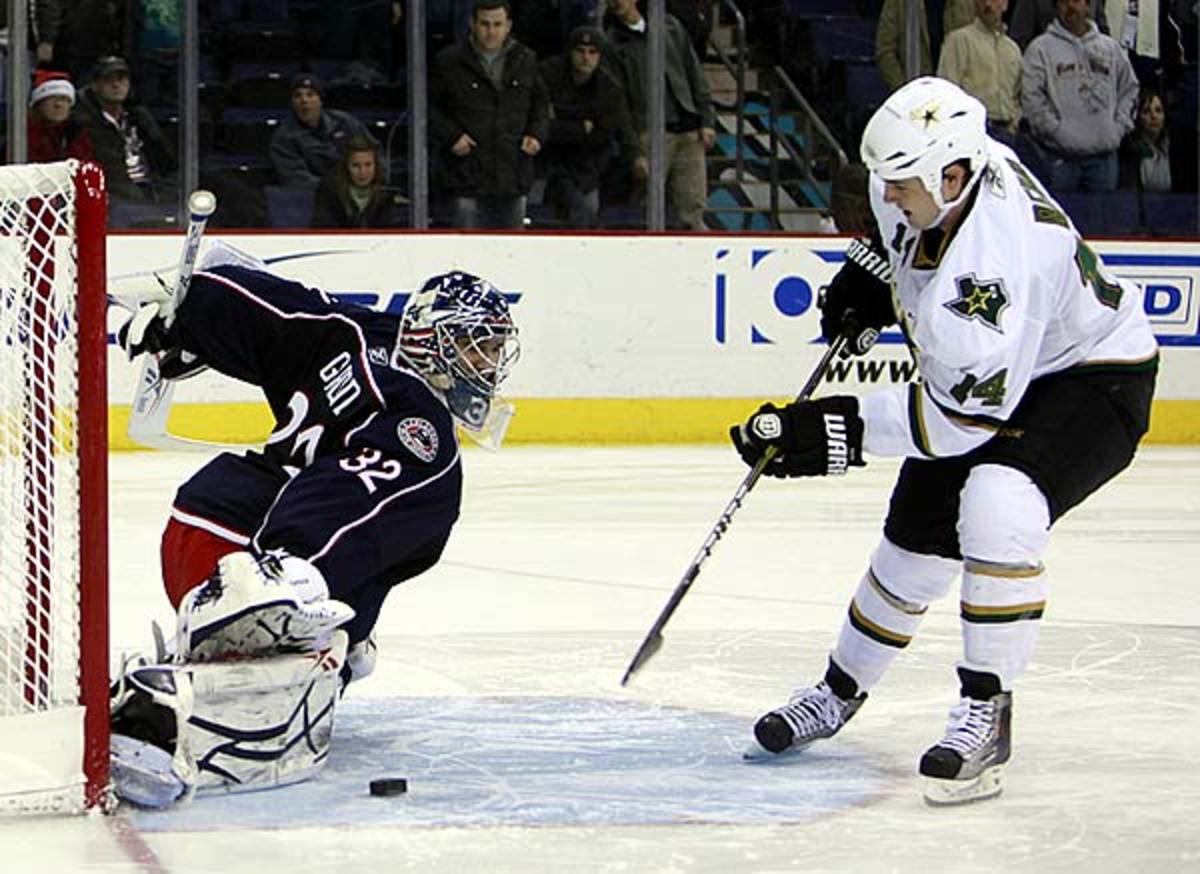Why I hate the shootout
It may be exciting for some people, but the shootout is really just deciding a hockey game without having to play any actual hockey. (AP Photo)
By Stu Hackel
It's the biggest gimmick in the post-lockout NHL and it looks like we're going to be stuck with the current shootout format for a while longer.
A creative suggestion by Red Wings GM Ken Holland for the NHL to minimize the postgame skills competition -- shifting to an overtime format that would have a four minute four-on-four period followed by a four minute three-on-three period before moving to the shootout -- was discussed at the GM's meetings last month, and further discussions are scheduled for their next gathering in March.
However, Commissioner Gary Bettman announced on Tuesday at the NHL Board of Governors meeting (video) that the shootout will remain the league's format for breaking tie games. He didn't mention Holland's proposal as it probably hasn't formally come before the board yet, so there's nothing to say.
But the impression Bettman left was that with the number of shootouts is in serious decline this season. He said they are down by about half compared to 2009-10, which had nearly 15 percent of all games go to the skills competition, an all-time high. He also threw in that last season might have been an aberration, but in fact, this season is the aberration; every year until now, the percentage of games that went to the shootout had been in double digits, the lowest approaching 12 percent.
The league signaled some disillusionment, if that's the right word (and it may not be), with the shootout this summer by changing its tie-breaking formula at the end of the season: if teams are tied in the standings, the first tiebreaker is now the greater number of games won by a club excluding games won in the shootout.
Now, some poor misguided people -- including my friend and colleague Michael Farber, an admitted shootout-aholic -- actually support the shootout. I, on the other hand, am a hockey-aholic. I have always found the postgame skills competition a contrived way to arrive at a result. It's deciding the outcome of a hockey game without actually playing hockey and I want to see hockey. Sudden-death overtime is one big reason why Stanley Cup play is the best hockey of the year. I'll take more of that, thanks.
For what it's worth, on last night's NHL on TSN intermission panel (video), Bob McKenzie, Darren Pang and host James Duthie all endorsed Holland's idea. Craig MacTavish seemed to like the shootout as it is, especially after watching this cute move Monday by the Maple Leafs' Mikhail Grabovski...
...but while it's nice eye candy, (Jason Blake had done that move a couple of years ago), it's not the kind of thing you see in game action, where there are defenders on the ice who actually try to prevent such shenanigans.
If the logic of the shootout were extended to other sports, Major League Baseball would stop a tied ballgame after nine innings and stage a home run derby to determine the winner (complete with Chris Berman yelling "Backbackbackbackback...."), the NBA would settle things with a thrilling free throw competition (can your heart stand it? Or, slightly better, a game of Horse), and the NFL would put the ball on the 30-yard line and decide matters with field goals -- which is, in some ways, like most OTs are settled. I'm not a big fan of that, either, but at least they play some football.
So, I'm hoping the GMs seriously consider Holland's proposal even if the low rate of shootouts continues. I think his idea will be even more exciting than the current format. And, actually, I have some experience with something similar to what Holland suggests.
Every year, I coach a group of beer leaguers in a tournament in Montreal. We generally do well, but about five years ago, we found ourselves tied after overtime in the gold medal game even though we had dominated the contest. The format called for two minutes of four-on-four, followed by two minutes of three-on-three, followed by two minutes of two-on-two and then two minutes of one-on-one -- that's right, one skater per side and the goalies. You stay at one-on-one until someone scores.
The format made it, in all honesty, the most exciting conclusion to a game I'd ever seen at that level of competition. Every shift had glorious chances to end it, mostly by our team. We went all the way down to the the one-on-one, and there were some great chances. One of our guys in the two-on-two had the goalie down on his back and fired a low shot, but the netminder lifted his head and knocked it away with his mask. Never saw that before.
Now we're down to the first round of one-on-one, and I selected my most skilled player, a great little defenseman named Gary Belliveau. Gary can skate all day in normal circumstances, but after about a minute against their best guy, chasing each other around the ice, he was wearing out fast. Gary skated with the puck to our bench, banged it off the boards and out of immediate danger and called for a replacement.
Now, I'd never coached a game like this before and I hadn't figured that Gary would tire out, so I didn't have anyone ready. Gary yelled for a change, but everyone, myself included, just froze at the bench. And by the time we figured out who to send on, the other guy had the puck and Gary had to stay on to battle him. He stopped the guy, and we made it to the buzzer. We won the game on the next shift, but in the process, I became the only coach in history to screw up a one-man line change.

































